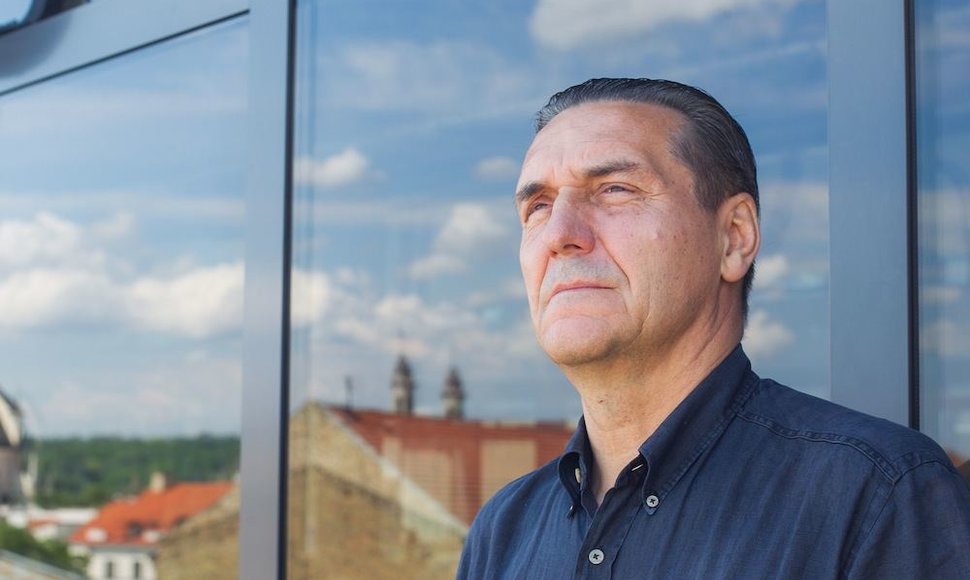Therefore Lithuania's freedom is a miracle of history – the Soviet empire did not give its possessions away easily.
Exactly 25 years ago, on 3 June, the Sąjūdis initiative group first gathered at the Academy of Sciences. Kaušpėdas was one of the godfathers of the movement that eventually led Lithuania out of the Soviet Union. Kaušpėdas' role was bringing strife for freedom from politicians' soapboxes to the common people – by inviting them to the famous Rock Marches. His band Antis, consisting of amateur musicians-architects, dared to mock Stagnation-era Soviet life and became the flagship of the Singing Revolution.
– When you hear the word Sąjūdis today, what first comes to mind? – 15min asks Kaušpėdas.
– Sąjūdis is our glorious past, history, and memory. The associations it conjures up for me are of a rebirth, spontaneous liberation from the communist dictatorship. I now feel like a veteran from those times and those developments.
– What was the prevailing mood back then? One of joy or, on the contrary, solemnity, focusing on the fateful decisions that had to be made?
– It was a very grave movement. There was a universal desire to achieve freedom.
Nothing unites better than a common enemy. When the enemy was identified with an external force that occupied our country, everyone thought that once we got rid of that external force, we'd be free and independent, all the problems would just go away. There was so much euphoria, faith in the future, that it made everything seem very easy.
But everything could have ended like in Hungary in 1956 or Czechoslovakia in 1968, the movement brutally crushed and its leaders imprisoned. No one would have stood up for us. America would have expressed some regrets, some European countries might have made some noise, but no one would have come to save us.
Our freedom is a historical miracle, the empire never gave anything away that easily. In 1918, too, we gained independence because the Bolsheviks were temporarily weakened.
– In one interview, your former wife Audra says: “Around 1980, it seemed that this time of mud, the mist will last forever, that it won't ever change.” Why did the mist clear after all?
– The policies of the Sąjūdis were sensible and gradual. When we couldn't speak, we wouldn't, but each time we'd allow ourselves more and more, until finally, during the 16 February 1989 rally in Kaunas, we said – this is it, we're speaking openly, independence is our goal.
After that, our relations with the local chapter of the Communist Party and Moscow went sour, confrontation ensued. Luckily for us, the Soviet Union was in crisis, as, even amidst all the reform, no one had a clue how it should look. They granted certain rights and went, as Russians say, методом научного тыка (method of scientific experiment) – try one thing, then another. These experiments had left the Soviet Union weakened.
Whether we want to admit it or not, it was Mikhail Gorbachev himself who generated all the mess. He was dependant on the West, styled himself as a new kind of thinker, a genius, so he neglected the Baltic states issue. Neglected to such an extent that it was hard to change anything.
That's why he is now regarded as the greatest villain who has destroyed Russia's geopolitical potential. We could say, therefore, that Mikhail Sergeyevich Gorbachev is a co-author of our independence. Because his haphazard policies, which he probably did not entirely grasp himself, caused chaos and let us make our run from the empire. The Sąjūdis acted very prudently then and decisively – if we hadn't declared independence on 11 March 1990, all roads would have been legally blocked.
– Is current Lithuania very far from those visions you had in Sąjūdis rallies and Rock Marches?
– 25 years is too short a period to see final results. We're still in transition, much has been achieved, but just as much remains to be done. Lessons we've learnt have not been in vain, they pushed us towards quality and maturity.
Back then, I could not even dream about a Lithuania that it is now and all the opportunities – the internet and such things. I remember deputies in the assembly saying: We will walk in clogs to Independent Lithuania if need be. No one remembers those clogs any more.
The first stage – regaining freedom, reconstituting an independent state – is but half of all the work. The other half is finding and creating inner freedom, so that every person can be a creator, a conscious citizen. It is not a collective task – everyone must work on their mental and spiritual development individually. Everyone of us must independently walk the road. And then these individual personalities, Lithuanian after Lithuanian, will come together to form Lithuania. There's no other way.
– It would seem that we can keep our national identity and survive only under oppression, while freedom leaves us disoriented.
– Indeed, we remember God, community, higher things we have in common only in critical times. When everything goes well, one wants to concentrate on oneself, to lock up in one's house, in wealth, and not care about anything beyond one's walls, to give nothing, just take.
I feel that people greatly lack a sense of responsibility. It is the greatest problem of our nation at the time. Without responsibility, national altruism, we are not a nation, but merely separate atoms in their homes. We use all the national things as if they were some external attributes.
A nation must have tasks. Perhaps it is up to politicians to formulate challenges and mobilise people – let's go and do it! It is a matter of having leaders who can consolidate and trigger a conscious movement towards our goals.
– Do our problems come from a certain shortage of ideas then?
– It is a complicated question. One must understand that at the base of the pyramid of values are the basic necessities of physical existence. If a person must survive on minimum wages, hardly making ends meet, he will never be conscious – he'll think as a client. We live in rather troubled times, we are too poor to be fully conscious citizens.
We must live through, as Kabbalah tells us, or ripen our egotism. In order to live through it, we must experience everything – build ourselves big houses, feel the loneliness in them, so we can later say: that stage is in the past, I now want to do something for the community and not just for myself.
– Perhaps that's just our nature – to see only negative things, perhaps we're not doing that bad? It must have been worse 25 years ago.
– I am very optimistic, I am happy with how things are, I live well, I can fulfil myself both as an architect and a musician. I am not complaining, not at all. When we're complaining about how bad Lithuania is, we're actually complaining about ourselves.













